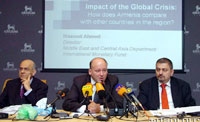“There are no countries to benefit from the international crisis, all countries have losses. Accordingly, experts say that countries should fight the crisis with joint efforts,” said Levon Barkhudaryan, former minister of finances and the incumbent elder adviser of AVAG Solutions company, during a recent discussion on the topic of Influence of the Global Economy and Crisis on the Economy of Armenia. He says that currently experts are making very general estimations of the situation and predictions, according to which the crisis will be overcome starting from the beginning of 2010, after which the world economy will start growing again. According to Mr. Barkhudaryan, Armenia has overcome the first phase of the crisis very successfully because our country is not integrated with international institutions at a high level. However, a number of processes such as reduction of money transfers and world prices of metals have affected the economy of Armenia. He believes countries should make comparative analysis to find out the harmonic effects of the crisis and behavior of other countries. During the discussion Masud Ahmed, the head of the IMF department of Middle East and Central Asia, said that 2009 is a narrow year, which means Armenia’s economy will suffer from it anyway. Starting from 2010 the situation will become stabile but there will not be significant stabilization and growth in developed countries. According to the IMF official, the countries of South Caucasus had good economic growth during the past 5-6 years due to structural reforms and increasing the capital inflow. However because of the crisis all the countries of the region were faced with economic problems and export capacities were cut down rapidly. He says that this reduction was slower in Armenia than in the neighboring countries. The capacities of investments in Armenia have drastically fallen too. “Armenia has certain specifications, which differ from the neighboring countries in the region. The capacity of uncovered borrowings and credits is still low in Armenia but it tends to growing. The level of crisis is lower in Armenia compared to other countries,” said Mr. Ahmed.
Vache Gabriyelyan, deputy president of the Central Bank, said that the first phase of the crisis did not affect Armenia’s economy so much because Armenia had not borrowed demand credits (to be returned upon demand). “Armenia takes credits mainly from the major international institutions with privileged terms. We don’t have a problem of returning credits urgently, which results in some stability,” he said and emphasized that Armenia’s economy was stabile during the first phase of the crisis also due to the stabile banking system. He says that currently banks are very cautious first of all due to the macroeconomic instability. They had losses, which have not affected the overall situation. During 2008 and the first quarter of this year the owners increased the banking capital by 37 per cent. Vache Gabriyelyan believes the difficulties in the financial market of Armenia are resulted from external negative influence. “We have overcome the first phase of the crisis but still there will be difficulties. We are still focused on the policy of resisting the inflation. The inflation level in Armenia is the lowest one among the CIS countries. It enables us to think of economic activation,” said the CB deputy president.

